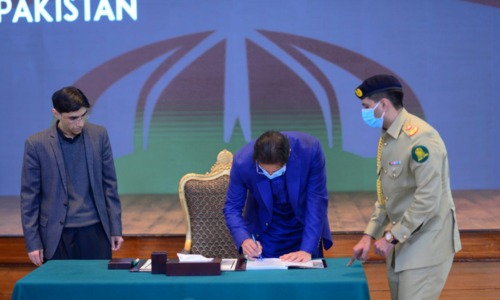‘NATIONAL security’, as a concept, is constantly being redefined worldwide. Because of its dynamic nature, many nations evolve and announce strategies to bolster their national security. In Pakistan too, a National Security Policy (NSP), the first ever, has been formulated around the concept of ‘comprehensive’ national security. The argument is that the nation of Pakistan will be truly secure only if it has economic and human security alongside military security. Sounds appealing. However, we need to unpack the concept to understand it better.
Traditionally, the threat to the Pakistani nation occurred at its borders, emanating mostly from India. Hence, creating a robust military infrastructure became a strategic imperative for Pakistan. Over time, threats to our national security started to emerge not just from outside but also from within. The enemy could create conditions of political, economic or societal mayhem, and thus achieve the same purpose that it would have achieved by a direct attack but at a far lower cost. Thus arose the need to address what is often referred to as ‘non-traditional threats’ to national security.
Read more: National security more than just about military power, encompasses inclusive growth: PM Imran
Some academics regard the term ‘non-traditional’ as way too vague. So let’s be more specific. Climatic effects, like flash floods, heatwaves or drought could kill far more people than a war would. Infectious diseases and pandemics play havoc with a nation. Natural disasters kill thousands. Terrorism and violent extremism emanate from internal and external sources alike. Disinformation campaigns demoralise a nation. Economic coercion such as sanctions can build up serious economic pressures. Poverty, hunger and unbridled population growth are major hindrances to sustainable development. Cyberattacks can cripple the institutions of any state, far or near.
Clearly, the threat spectrum has grown so wide that only a comprehensive national security policy can help ensure peace, stability and the development of a nation. The NSP 2022-26, which the government has just announced, defines the “ultimate purpose” as enhancing the “safety, security, dignity, and prosperity” of our citizens. A noble objective indeed. Another notable feature is that economic security would be the core of national security. This also makes sense. Unless we have enough economic resources, we cannot guarantee even traditional military security, let alone protect the safety and dignity of our fellow citizens. We have repeatedly seen how economic dependence on donors drastically shrank our policy choices.
How will the government implement the NSP?
So, the logic of evolving a comprehensive national security to counter such a wide spectrum of internal, external and natural threats is perfectly sound. The real challenge, however, is how do we implement such a broad-based strategy. Last week, while introducing the policy, our national security adviser suggested that we initiate an ‘intellectual debate’ on the NSP. At first, I thought that would make the document controversial. On deeper reflection, however, I agree with the suggestion because our nation must not shy away from debating an issue of such monumental importance that would touch the life of every citizen. In fact, only through debate would one discover the areas in which the NSP is deficient and identify the themes that might require greater emphasis.
Editorial: The expanded definition of national security in the new policy is a welcome one
Beyond the theoretical debate on the NSP, what is of far greater significance is how would the government implement such a transformational concept of pursuing a citizen-centric approach with economic security at its core. That would require a comprehensive implementation framework, with each sectoral department or agency preparing an implementation matrix, with clear objectives, strategy, indicators of achievement, oversight and accountability mechanisms, and a dynamic follow-up.
Since government departments jealously guard their turf, which central authority would periodically review the progress? Will our political governance model allow such centralised monitoring? Can the National Security Division or National Security Committee, which houses both the civil and military leadership, oversee the progress made in the implementation of the NSP? Will the Council of Common Interests have any role? How will provinces be co-opted to fully own the strategy? And how would grassroots governance — districts, tehsils, and towns — be engaged to ensure that their development work is in line with the priorities identified in the NSP?
These are profound questions. The answers can emerge but only if serious efforts are made to forge a nationwide political consensus on the NSP. Equally important is the need for coordination and coherence amongst the branches of government and the relevant stakeholders. Let us hope that in the coming weeks the debate will focus on practical implementation of the NSP, and not just on its broad contours.
The writer is a former foreign secretary and the author of Diplomatic Footprints.
Published in Dawn, January 18th, 2022















































